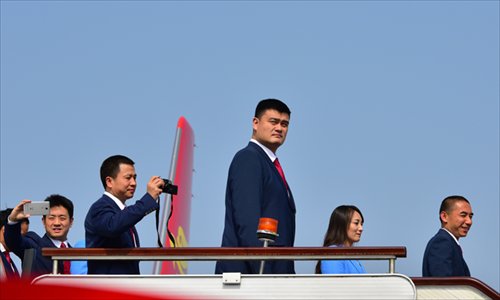2022 Games to push economic reforms
Olympics will help achieve air quality goal in advance

Yao Ming, a former NBA star and an ambassador for Beijing in its bid for the 2022 Winter Olympic Games, walks out of a plane on Sunday with the other members of the delegation at an airport in Beijing. Beijing on Friday won the bid to host the Games. Photo: CFP
Beijing's successful bid for the 2022 Winter Olympics will bring more investment opportunities, create new impetus to curb air pollution and help push economic reforms, analysts say.
The Chinese capital, along with its partner city Zhangjiakou in Hebei Province, beat Kazakhstan's Almaty on Friday for its "focus on sustainability, legacy and transparency," according to the International Olympic Committee.
"By accelerating the construction of Olympic venues, local authorities will open up more sectors to private investment to boost development," Guan Qingyou, an economist at Minsheng Securities, said in a research note sent to the Global Times on Sunday.
Beijing will become the first city ever to stage both Summer and Winter Games.
The Games are expected to help upgrade the transportation network in the Beijing-Tianjin-Hebei region.
The Zhangjiakou airport, which opened in 2013, will be expanded in the near future thanks to the Games, to a capacity of 200,000 passengers every year.
The construction of the Beijing-Zhangjiakou high-speed rail service, an integral part of the government's Beijing-Tianjin-Hebei Intercity Rail Master Plan, will be completed by early 2019, the Xinhua News Agency reported Friday.
Enhance tourism
Zhang Wuming, director of the regional strategy research center at the Beijing-based FangTang Think Tank, told the Global Times the country's plans to develop a winter sports industry will enhance Zhangjiakou's reputation as a tourist destination by upgrading its transportation system and facilities, such as hotels and restaurants.
The city has 33 three-star or higher-rated hotels and the number of similar hotels is expected to exceed 20 in Chongli county alone by 2020, which will be able to accommodate over 20,000 people daily and up to 4 million visitors annually, according to the website of the Beijing 2022 Olympic Winter Games Bid Committee.
Besides a ski area in Chongli county, local authorities have begun a 6.8-billion-yuan ($1.10 billion) project to develop an industrial park in the city's high-tech development zone, according to an announcement on the website of the Zhangjiakou Development and Reform Commission in April.
Zhang said that compared to Zhangjiakou, Beijing will use the event to showcase its economic and political reforms.
"By working with foreign sponsors and organizations, people will realize that the Chinese government is trying to improve its level of transparency and efficiency," Zhang said.
The 2022 Winter Olympic Games will also compel Beijing to clean up its air, analysts said.
China launched a plan in February 2012 to lower the key air pollutants by 30 percent than in 2010, with PM10 concentrations dropping to 80 microgram per cubic meter and PM2.5 levels to 50 microgram per cubic meter.
"2015 data shows that it is possible to reach the goal in advance since we have to fulfill our promise on air quality for the 2022 Winter Olympic Games. Authorities need to better enforce the new environmental laws, close or renovate polluting enterprises and develop renewable sources of energy," Yang Fuqiang, senior adviser on climate and energy of the Natural Resources Defense Council, told the Global Times.
It also needs neighboring regions, especially Shanxi Province and the Inner Mongolia Autonomous Region, to help curb pollution, Niu Fengrui, an expert on city planning and development at the Academy of Social Sciences, told the Global Times.